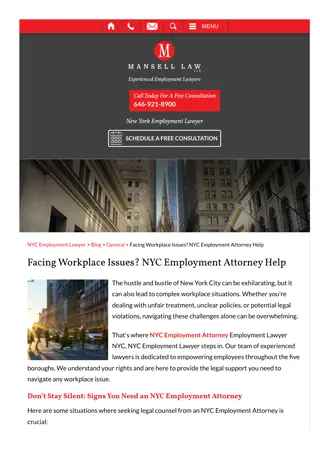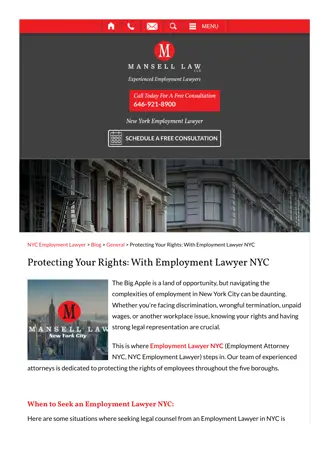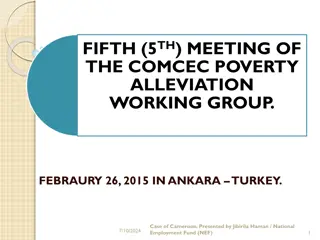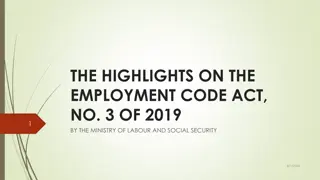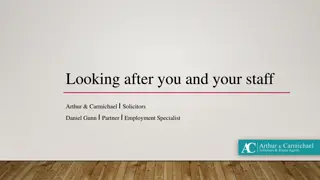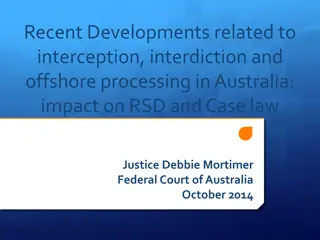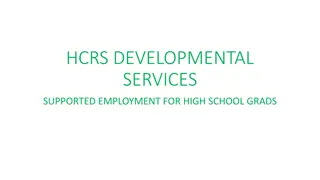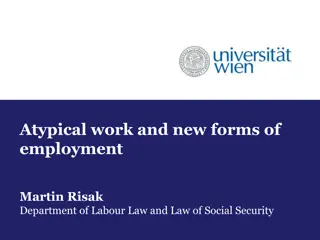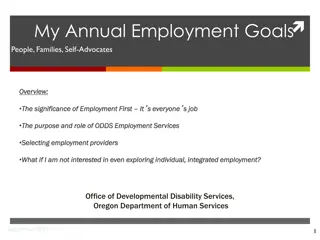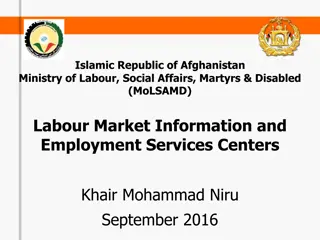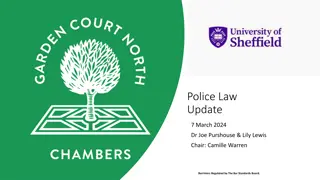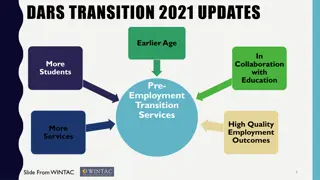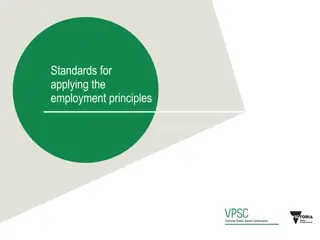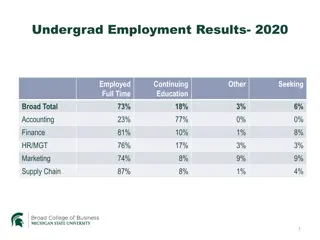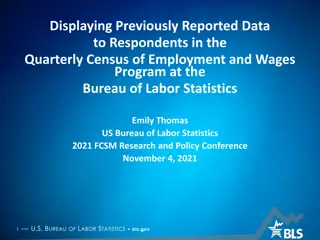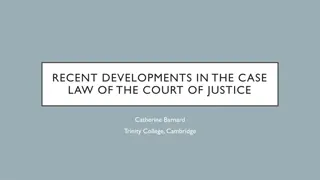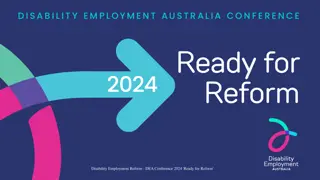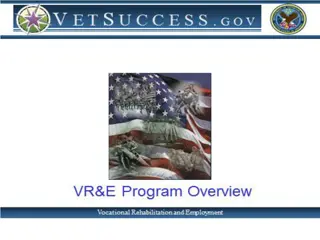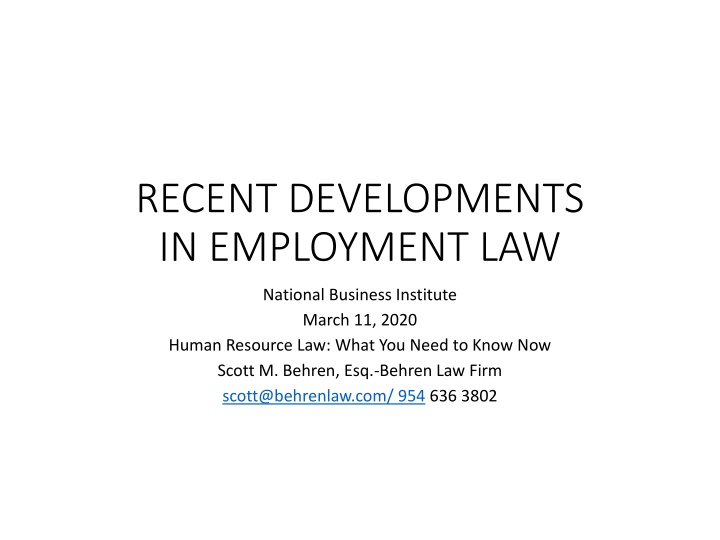
Recent Developments in Employment Law: Key Issues and Insights
Stay updated on the latest trends in employment law, including EEOC hot issues, workplace bullying, and the impact of medical marijuana in Florida on employers and employees. Explore important topics such as protecting vulnerable workers, enforcing equal pay laws, and addressing off-workplace marijuana use. This comprehensive overview covers essential information for HR professionals and legal practitioners in the ever-evolving landscape of employment law.
Download Presentation

Please find below an Image/Link to download the presentation.
The content on the website is provided AS IS for your information and personal use only. It may not be sold, licensed, or shared on other websites without obtaining consent from the author. If you encounter any issues during the download, it is possible that the publisher has removed the file from their server.
You are allowed to download the files provided on this website for personal or commercial use, subject to the condition that they are used lawfully. All files are the property of their respective owners.
The content on the website is provided AS IS for your information and personal use only. It may not be sold, licensed, or shared on other websites without obtaining consent from the author.
E N D
Presentation Transcript
RECENT DEVELOPMENTS IN EMPLOYMENT LAW National Business Institute March 11, 2020 Human Resource Law: What You Need to Know Now Scott M. Behren, Esq.-Behren Law Firm scott@behrenlaw.com/ 954 636 3802
EEOC Hot Issues Eliminating Barriers in Recruitment and Hiring Protecting Vulnerable Workers Including Immigrants and Migrant Workers Emerging Issues such as Inflexible Leave Policies, LGBT Coverage under Title VII, Intersection of PDA and ADA Enforcing Equal Pay Laws for all Workers Preserving Access to Legal System Preventing Systemic Harassment
Workplace Bullying Not expressly provided for under state for federal laws Attempts to expand OSHA and Whistleblower Protections into this Area Attempts at legislation in many states
Medical Marijuana in Florida Does employer have to accommodate an employee who uses it under the Florida Civil Right Act or ADA or County Ordinances? How does employer address off workplace use of it?
Medical Marijuana in Florida Florida Amendment II passed 11/16 allowing medical marijuana in Florida if someone has an enumerated condition or debilitating medical condition
Medical Marijuana in Florida A physician shall not be subject to criminal or civil liability or sanctions under Florida law solely for issuing a physician certification with reasonable care to a person diagnosed with a debilitating medical condition in compliance with this section. Fla. Const. art. X, 29(a)(2)
Medical Marijuana in Florida LIMITATIONS (1) Nothing in this section allows for a violation of any law other than for conduct in compliance with the provisions of this section. (2) Nothing in this section shall affect or repeal laws relating to non-medical use, possession, production, or sale of marijuana. (3) Nothing in this section authorizes the use of medical marijuana by anyone other than a qualifying patient. (4) Nothing in this section shall permit the operation of any vehicle, aircraft, train or boat while under the influence of marijuana. (5) Nothing in this section requires the violation of federal law or purports to give immunity under federal law. (6) Nothing in this section shall require any accommodation of any on-site medical use of marijuana in any correctional institution or detention facility or place of education or employment, or of smoking medical marijuana in any public place. (7) Nothing in this section shall require any health insurance provider or any government agency or authority to reimburse any person for expenses related to the medical use of marijuana. (8) Nothing in this section shall affect or repeal laws relating to negligence or professional malpractice on the part of a qualified patient, caregiver, physician, licensee, or its agents or employees.
Medical Marijuana in Florida Florida Senate Bill SB8A passed in 2017 Special Legislative Session. Defines a Qualified Patient as a resident of this state*who has been added to the medical marijuana use registry by a qualified physician to receive marijuana or a marijuana delivery device for a medical use and who has a qualified patient identification card. OUTLAWSuse of marijuana in any of the following places: b. c. a. On any form of public transportation, except for low-THC cannabis. In any public place, except for low-THC cannabis. In a qualified patient s place of employment, except when permitted by his or her employer. d. In a state correctional institution, as defined in 944.02 of the Florida Statutes, or a correctional institution, as defined in 944.241 of the Florida Statutes. e. On the grounds of a preschool, primary school, or secondary school, except as provided in 1006.062 of the Florida Statutes. f. In a school bus, a vehicle, an aircraft, or a motorboat, except for low-THC cannabis.
Medical Marijuana in Florida (2) diagnosed with at least one of the following conditions to qualify to receive marijuana or a marijuana delivery device: (a) Cancer. (b) Epilepsy. (c) Glaucoma. (d) Positive status for human immunodeficiency virus. (e) Acquired immune deficiency syndrome. (f) Post-traumatic stress disorder. QUALIFYING MEDICAL CONDITIONS. A patient must be
Medical Marijuana in Florida (g) (h) (i) (j) (k) to those enumerated in paragraphs (a)-(j). (l) A terminal condition diagnosed by a physician other than the qualified physician issuing the physician certification. (m) Chronic nonmalignant pain. Amyotrophic lateral sclerosis. Crohn s disease. Parkinson s disease. Multiple sclerosis. Medical conditions of the same kind or class as or comparable
Medical Marijuana in Florida Fla. Const. art X, 29(c)(6): Nothing in this section shall require any accommodation of any on-site medical use of marijuana in any correctional institution or detention facility or place of education or employment, or of smoking medical marijuana in any public place. Fla. Stat. 381.986(15): This section does not require an employer to accommodate the medical use of marijuana in any workplace or any employee working while under the influence of marijuana.
LGBT Discrimination Illegal under Palm Beach, Miami Dade and Broward Ordinances Illegal under Title VII, will see this year, US Supreme Court heard oral arguments on three cases and will issue ruling on whether Title VII covers LGBT this year Will see whether Florida follows US Supreme Court authority or creates their own law
ME TOO Movement Not slowing down 7609 sexual harassment cases received by EEOC in 2019 Up 13.6 percent from prior year Follow internal training and sexual harassment policies strictly
Joint Employer Doctrine Both NLRB and Department of Labor in process of passing rules to make it more difficult for employees to prove a joint employer DOL now want to use four factor test Whether hires or fires employee Whether supervises and controls employee work conditions Whether determines employees rate of pay Whether maintains the employees work records
Off the Clock Work from Home Kara Baker v. Park Place Surgery Center, LLC, Case No: 17-cv-1456-Orl (M.D. Fla. 10/23/18)(CONTINUED) [I]n situations where the employer's records cannot be trusted and the employee lacks documentation, the Supreme Court held that an employee has carried out his burden if he proves that he has in fact performed work for which he was improperly compensated and if he produces sufficient evidence to show the amount and extent of that work as a matter of just and reasonable inference. The burden then becomes the employer's, and it must bring forth either evidence of the precise amount of work performed or evidence to negate the reasonableness of the inference to be drawn from the employee's evidence. If the employer fails to produce such evidence, the court may then award damages to the employee, even though the result be only approximate
ADDRESSING OFF THE CLOCK WORK Andrea Auer v. Florida Neurological Center, LLC, Case No: 17-cv-411- Oc-30PRL (M.D. Fla. 11/26/18) Summary judgment denied where there was evidence from which a jury could conclude that employee was working off the clock from home with Defendant s knowledge
ADDRESSING OFF THE CLOCK WORK Kara Baker v. Park Place Surgery Center, LLC, Case No: 17-cv-1456-Orl (M.D. Fla. 10/23/18) Worked on time clock but sometimes time clock did not work and sometimes worked from home Relied upon supervisors to input time when clock broken and when working at home
ADDRESSING OFF THE CLOCK WORK Kara Baker v. Park Place Surgery Center, LLC, Case No: 17-cv-1456-Orl (M.D. Fla. 10/23/18)(CONTINUED) Employee can also survive claim for overtime where a jury could find that employer knew or should have known of overtime worked by employee SJ denied because there were issues of whether employee worked overtime and whether employer knew of overtime worked
CLARIFYING REGULAR RATE REGULATIONS US Dept of Labor Notice of Proposed Rulemaking to Update Regulations Governing the Regular Rate under the FLSA (dated March 2019) FLSA requires employee be paid OT at one and one half times the regular rate for hours worked over 40 hours per workweek Regulations defining regular rate have not been significantly revised in 50 years Public Comment Period was open until 5/28/19
CLARIFYING REGULAR RATE REGULATIONS Attempt to clarify whether perks and benefits to employees must be included in the regular rate to determine overtime. Seeks to exclude from regular rate: Cost of providing wellness programs PTO and sick leave Travel expenses Tuition programs Discretionary bonuses Benefits plans such as for accidents, legal services, etc.
SALARY BASIS AND DUTIES TEST-ARE EMPLOYEES EXEMPT OR NON EXEMPT POSITIONS EXEMPT FROM OVERTIME Many exemptions, but typically must be (a) paid at least $23,600 per year ($455 per week) and (b) be paid on a salary basis and (c) perform exempt job duties. Typically need to meet all three criteria to be exempt DOL revised regulations with effective date of Jan 1, 2020 to require exempt employees to be paid at least $684 per week
Florida Cases Ross Dress for Less, Inc. v Annie Higgins, Case No 4D18-3798 (Fla. 4th DCA 6/26/19) Employer by seeking cause determination from EEOC did not waive right to seek arbitration
Rhonda Davis v. Florida Dept of Corrections, Case No: 5D18-2745 (Fla. 5thDCA 11/8/19) Must make sure and exhaust each claim you want to bring with EEOC or FCHR including retaliation claims
Miami-Dade County v. Harris, 278 So.2d 103 (Fla. 3rdDCA 2019) Under Florida Public Whistleblower Statute must exhaust administrative remedies within 60 days or cant proceed to lawsuit. Fla. Stat 112.3187
School Board of Hillsborough County v. Woodford, 270 So.3rd481 (Fla. 2d DCA 2019) Another case where trial court was reversed based upon failure of employee to exhaust administrative remedies under Florida Public Whistleblower Act
Juan Iglesias v. City of Hialeah, Case No: 3D18-639 (Fla. 3rdDCA 7/24/19) Trial court reversed where held that employee could not recover noneconomic damages under Florida Private Whistleblower Act Remedies provided under Fla. Stat. 112.3187(9) are a floor and not a ceiling
Picture it Sold Photography, LLC v. Scott Bunkelman, Case No: 4D19- 1427 (Fla. 4thDCA 1/8/20) Non-compete case Trial judge reversed for not granting temporary injunction against former employee Employee admitted to soliciting former employers customers some of which said they would not do future business with employer anyway

